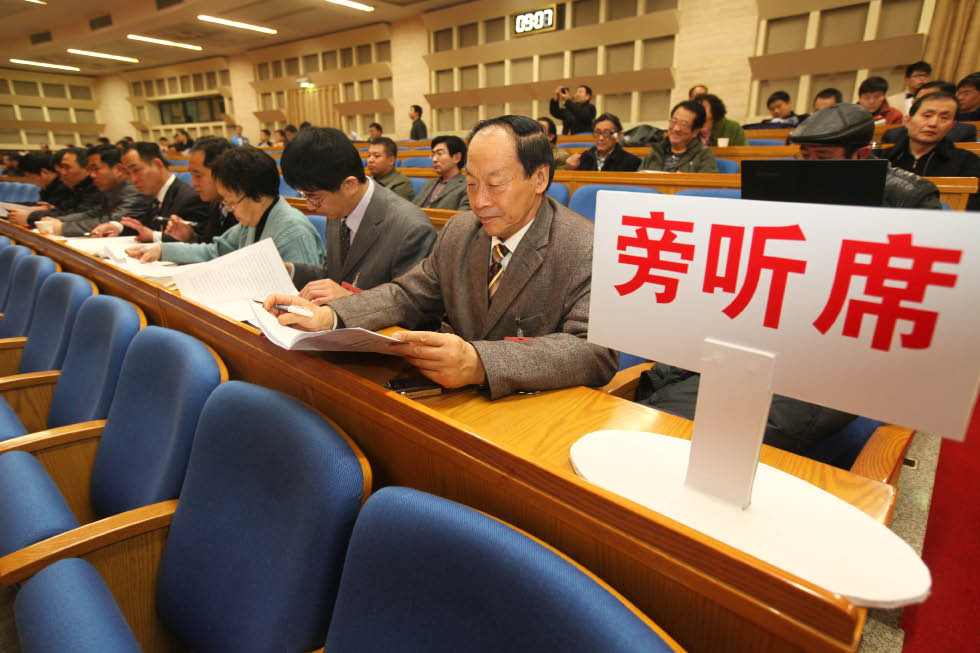Hard and Fast on the Path of Reform
- By Hou Ruili
 0 Comment(s)
0 Comment(s) Print
Print E-mail China Today, February 26, 2014
E-mail China Today, February 26, 2014
|
|
| The opening session on January 24, 2014 of the 11th CPPCC Shandong Provincial Committee that set a precedent by inviting 10 citizen representatives to attend. |
Innovating Democratic Forms
Every village in China has a villagers committee. Those of certain large villages, however, have several sub- committees that are responsible for specific issues. In 2013, Anhui Province proposed that villagers recommend and elect members of a villagers council under a sub-committee, whose focus would be on negotiating specific public affairs. Villagers councils in Wangjiang County, which were established to take responsibility for village affairs concerning public welfare, like road and bridge building, have raised a total of RMB eight million or more, expended more than 40,000 man hours and completed a spate of construction projects. The project initiated by the villagers' council of Liulingwei Village in Taici Township to clear mud from irrigation canals and ditches has benefited 2,000 mu of farmland (15 mu= 1 ha.). Villagers councils that pool talents and strength have been set up in 95 percent of villages in Wangjiang County. They administrate village affairs like infrastructure construction, waste disposal, dispute settling and assessing eligibility of households for basic living allowances.
In addition, the village supervision system is also a vital innovation of the mechanism for villager autonomy. Growing economic development in rural areas endows village cadres with ever-greater power and funds. It was the obvious need for democratic and transparent decision making, standardized finances and heightened supervision that prompted establishment of villager supervisory committees.
"At the end of last year, village cadres submitted their expense accounts. After checking every item we found five receipts that were non-refundable," member of the villager supervisory committee of Xiaoxian Village, Qian'an County in Songyuan City of Jilin Province Wang Dianjun said. One RMB 300 receipt that the committee did not sign was for an electric cooker. Wang explained, supervisory committees thus ensure that village cadres neither abuse their power nor be wrongly suspected.
The Internet is an important vehicle for community democracy innovations. October 2013 saw the setting up of a platform of public decision making for Nanjing property owners. It enabled them to choose their own property management company, decide on the use of house maintenance funds, and conveniently resolve other community-related issues. A few clicks of the mouse thus replaced the system whereby property owners' committee members collected votes door-to-door.
There has been no standardized property management during the process of commercialization of urban households over the past two decades. The disputes that have hence arisen between property owners and property management companies make democratic negotiations essential.
Prior to establishment of the Nanjing platform of public decision making, many communities had set up their own websites for democratic negotiation. Their activities ranged from group buying schemes to lonely hearts clubs, planting trees to raising dogs, and from soliciting donations to expressing viewpoints on both domestic and international news items. After discussion online, residents could finally reach consensus.
Property owners that participate in community democratic online consultations have equal status and voting rights. This facilitates better communication and more innovative explorations of grassroots democracy.
Democratic innovations in companies directly address the fundamental issue of salaries. At the end of each year, Fujian Shenghui Logistics Group holds group negotiations in this regard. Before the yearly negotiation, the trade union, together with the HR department, usually carries out wage and salary surveys based on workers' opinions. These are fully discussed in the group negotiation conference, in efforts to produce a salary scheme that constitutes a balance between the views of employees and of the employer. Upon the owner of the company and the head of the trade union signing an agreement, it comes into force the next year. In March of the next year another survey is carried out on the level of satisfaction with what has been agreed.
Wang Changjiang believes that combining democracy and interests is vital since democracy should reach where interests exist. Only if the people exercise their rights and participate in strategic decisions with regards to the path of development can the country's development mode be fundamentally changed and its sustainable progress guaranteed. This constitutes the core of fundamental public benefits.







Go to Forum >>0 Comment(s)